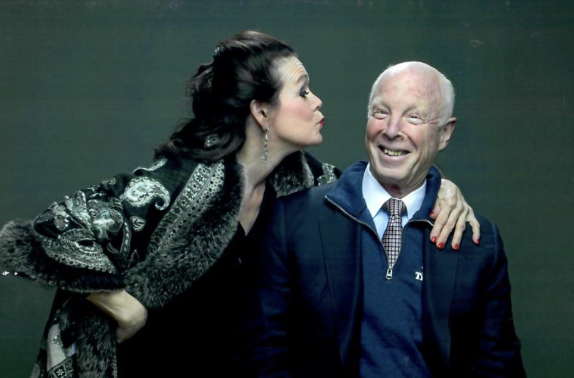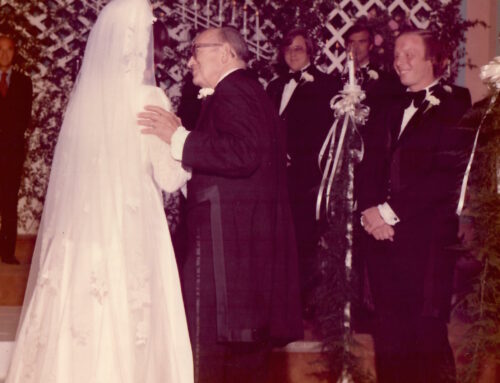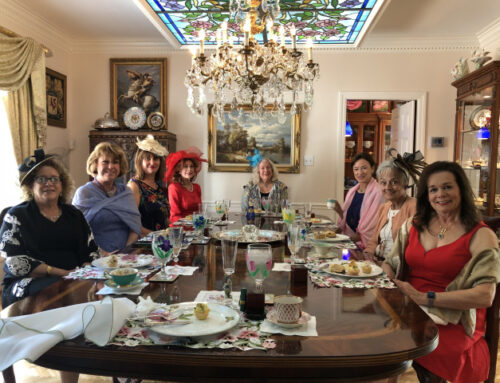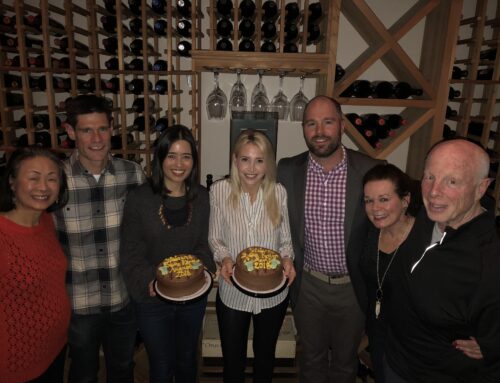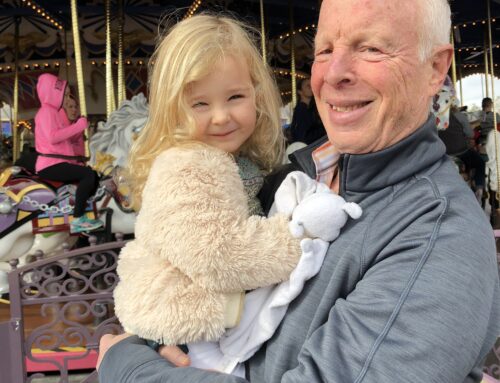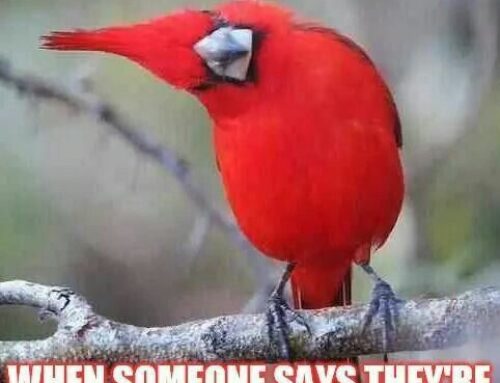My life changed forever when I lost my husband Ted Koplar, on April 4th, 2021. This is the first time I’ve written since that day. Well, that’s not true, I write every night to Ted in my journal before I go to bed.
Writing in general has been much more difficult because I’m not sure who I am anymore without Ted by my side. When you feel that your heart has been cut in half, there is nothing but blackness left.
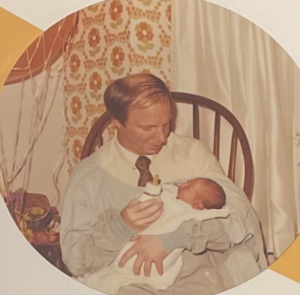
My world was once filled with color. I decorated my house in the deepest of reds and hottest of pinks—after all, I’m a child of the sixties who grew up in the wake of Elsa Schiaparelli’s fuchsia that was adopted by every fashion and home designer for the next 30 years. I personally thought she invented it for me. My garden outside my picture window bloomed with fuchsias, corals, roses, purples and oranges, all reflecting the colors of the singularly magnificent sunsets that appeared above our oaks at 6PM sharp on warm summer nights.
How do I start writing about the man that was my husband for over 46 years? The things I want to say are intimate, yet universal to all widows. I am writing this to try to recreate the part of me that died with him, hoping that in doing so I will feel joy again, and be able to share it with others.
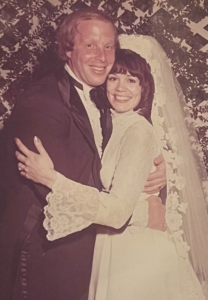
I’ve heard that when we lose someone close to us, they are not really gone, but in another room, and we should refer to them the way we always did before. Well, I’ve tried that.
Being the gourmet cook that I am, I say, “Ted, where do you want to go for dinner tonight?”
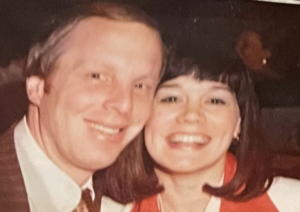 And not only do I not hear his answer, but I sit and wait in silence for him to come into the living room, thinking he’s just changing from his office clothes into something more comfortable, or maybe he’s watching the last few minutes of the Monday night football game. Soon I’ll hear his footsteps, in that familiar gait, clunking down our 18 stairs. He’ll stop to open the refrigerator, pick out a handful of grapes, then turn to me as I wait in my usual chair in the den and say, “So, where do you want to go for dinner tonight, Pooh?”
And not only do I not hear his answer, but I sit and wait in silence for him to come into the living room, thinking he’s just changing from his office clothes into something more comfortable, or maybe he’s watching the last few minutes of the Monday night football game. Soon I’ll hear his footsteps, in that familiar gait, clunking down our 18 stairs. He’ll stop to open the refrigerator, pick out a handful of grapes, then turn to me as I wait in my usual chair in the den and say, “So, where do you want to go for dinner tonight, Pooh?”
But none of that conversation happens. There is only silence where there used to be voices—our voices.
“Gee, honey, I don’t know. I ate a late lunch, so I don’t care where we go. You decide.”
“So, you’re not even hungry?” He asks, a little perturbed.
“You know me. I can always eat.”
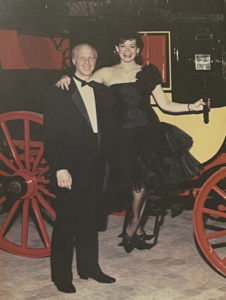 After bantering back ‘n forth like this for about five minutes, he helps me with my coat. We exit to the garage—and I cross around the back of his car to my proverbial passenger seat in front.
After bantering back ‘n forth like this for about five minutes, he helps me with my coat. We exit to the garage—and I cross around the back of his car to my proverbial passenger seat in front.
Ted backs out and starts down our long driveway. He stops abruptly, swinging his hand across my chest, as if to keep me from crashing into the windshield. Then, like a little boy, he puts his left pointer finger to his lips, and whispers: “Shh! Look!!”
And there, crossing in front of us, is a family of deer, acting like they don’t even see us, sauntering along like they own the place. This isn’t the first time Ted sees deer on our property, and it won’t be the last, but each time he does he is as awe-struck as a five-year-old boy who sees Rudolph on his roof on Christmas Eve.
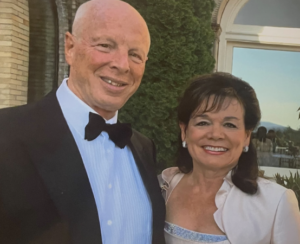 This is what I love about Ted. His five-year-old self is still squirming inside him. Like Forrest Gump, he doesn’t know what he’s incapable of. He believes he can do whatever he wants to do, and so he does.
This is what I love about Ted. His five-year-old self is still squirming inside him. Like Forrest Gump, he doesn’t know what he’s incapable of. He believes he can do whatever he wants to do, and so he does.
Our conversations—so banal and lacking in poetry to the outside ear, now play in my head like the most alluring symphony. His little corny jokes are now material that Seinfeld only wishes he could have come up with. A mysterious, tall and handsome man, he has now become the “World’s Sexiest Man Alive” on the cover of all my illusions.
Or are they delusions? I seem to see him everywhere I go. I see a tall man with his gait, and bald head in the distance, and I run to catch up, only to find that his familiar freckled face has morphed into a bearded and wizened man.
What I would not give to hold his hand just one more time. To look into his beautiful golden eyes again…to feel his big arms encircling me, smothering me like a bear into his cuddly barrel chest.
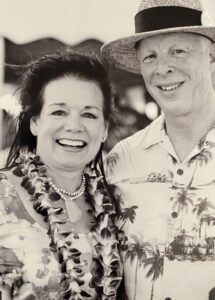 This longing I am told is good. It means that I love him and have loved him deeply. If I hadn’t, I wouldn’t feel this physical separation so sharply. It is a pain—not only emotionally, but physically— like the middle has been carved out of me. There is a hole that no one and nothing can fill. Heart surgery has not advanced enough to repair the invisible attacks of the heart—but only the ones visible to machines.
This longing I am told is good. It means that I love him and have loved him deeply. If I hadn’t, I wouldn’t feel this physical separation so sharply. It is a pain—not only emotionally, but physically— like the middle has been carved out of me. There is a hole that no one and nothing can fill. Heart surgery has not advanced enough to repair the invisible attacks of the heart—but only the ones visible to machines.
Even though I have a hole in my heart, my husband’s everlasting love will give me the strength I need to continue to live through this loss. In the musical, The Fantasticks, the narrator, El Gallo, sings, “Without a hurt, the heart is hollow.” I didn’t get it when I was a teenager, but I understand it today.
I’ve felt so much hurt these past two years, but through my suffering, meditation and a little magic from my husband above, I’ve somehow started becoming more empathetic and accepting of others. I’m also finding that after two years of solitude, I want to be around other people. And, through the love and support of my family—especially my beautiful children and grandchildren—I am beginning to experience joy once again.
I’m restarting my podcast, because it was Ted who encouraged me to begin it, and he would want me to continue doing what I’ve enjoyed. I want to reconnect with the wonderful women who are out there, who I have so much to learn from. And now that I’m a widow, I’m going to start my podcast with the woman who has helped me greatly during this time. She is Carolyn Moor, Founder of Modern Widows Club. By surviving and growing through her own personal tragedy, Carolyn has learned to use her strengths and leadership gifts to reach out and uplift the lives of over 13 million widows in the United States.
Please tune in to Woman Overboard on Wednesday, May 31st wherever you get your podcasts, or listen on my website: womanoverboard.com.
Love,
Nancy
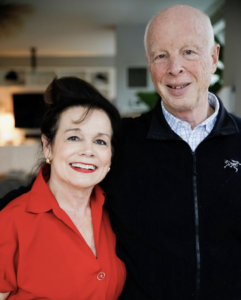 “Love can touch us one time and last for a lifetime, and never let go ‘til we’re gone.” – Celine Dion, My Heart Will Go On
“Love can touch us one time and last for a lifetime, and never let go ‘til we’re gone.” – Celine Dion, My Heart Will Go On
My life changed forever when I lost my husband Ted Koplar, on April 4th, 2021. This is the first time I’ve written since that day. Well, that’s not true, I write every night to Ted in my journal before I go to bed.
Writing in general has been much more difficult because I’m not sure who I am anymore without Ted by my side. When you feel that your heart has been cut in half, there is nothing but blackness left.
My world was once filled with color. I decorated my house in the deepest of reds and hottest of pinks—after all, I’m a child of the sixties who grew up in the wake of Elsa Schiaparelli’s fuchsia that was adopted by every fashion and home designer for the next 30 years. I personally thought she invented it for me. My garden outside my picture window bloomed with fuchsias, corals, roses, purples and oranges, all reflecting the colors of the singularly magnificent sunsets that appeared above our oaks at 6PM sharp on warm summer nights.
How do I start writing about the man that was my husband for over 46 years? The things I want to say are intimate, yet universal to all widows. I am writing this to try to recreate the part of me that died with him, hoping that in doing so I will feel joy again, and be able to share it with others.
I’ve heard that when we lose someone close to us, they are not really gone, but in another room, and we should refer to them the way we always did before. Well, I’ve tried that.
Being the gourmet cook that I am, I say, “Ted, where do you want to go for dinner tonight?”
 And not only do I not hear his answer, but I sit and wait in silence for him to come into the living room, thinking he’s just changing from his office clothes into something more comfortable, or maybe he’s watching the last few minutes of the Monday night football game. Soon I’ll hear his footsteps, in that familiar gait, clunking down our 18 stairs. He’ll stop to open the refrigerator, pick out a handful of grapes, then turn to me as I wait in my usual chair in the den and say, “So, where do you want to go for dinner tonight, Pooh?”
And not only do I not hear his answer, but I sit and wait in silence for him to come into the living room, thinking he’s just changing from his office clothes into something more comfortable, or maybe he’s watching the last few minutes of the Monday night football game. Soon I’ll hear his footsteps, in that familiar gait, clunking down our 18 stairs. He’ll stop to open the refrigerator, pick out a handful of grapes, then turn to me as I wait in my usual chair in the den and say, “So, where do you want to go for dinner tonight, Pooh?”
But none of that conversation happens. There is only silence where there used to be voices—our voices.
“Gee, honey, I don’t know. I ate a late lunch, so I don’t care where we go. You decide.”
“So, you’re not even hungry?” He asks, a little perturbed.
“You know me. I can always eat.”
 After bantering back ‘n forth like this for about five minutes, he helps me with my coat. We exit to the garage—and I cross around the back of his car to my proverbial passenger seat in front.
After bantering back ‘n forth like this for about five minutes, he helps me with my coat. We exit to the garage—and I cross around the back of his car to my proverbial passenger seat in front.
Ted backs out and starts down our long driveway. He stops abruptly, swinging his hand across my chest, as if to keep me from crashing into the windshield. Then, like a little boy, he puts his left pointer finger to his lips, and whispers: “Shh! Look!!”
And there, crossing in front of us, is a family of deer, acting like they don’t even see us, sauntering along like they own the place. This isn’t the first time Ted sees deer on our property, and it won’t be the last, but each time he does he is as awe-struck as a five-year-old boy who sees Rudolph on his roof on Christmas Eve.
 This is what I love about Ted. His five-year-old self is still squirming inside him. Like Forrest Gump, he doesn’t know what he’s incapable of. He believes he can do whatever he wants to do, and so he does.
This is what I love about Ted. His five-year-old self is still squirming inside him. Like Forrest Gump, he doesn’t know what he’s incapable of. He believes he can do whatever he wants to do, and so he does.
Our conversations—so banal and lacking in poetry to the outside ear, now play in my head like the most alluring symphony. His little corny jokes are now material that Seinfeld only wishes he could have come up with. A mysterious, tall and handsome man, he has now become the “World’s Sexiest Man Alive” on the cover of all my illusions.
Or are they delusions? I seem to see him everywhere I go. I see a tall man with his gait, and bald head in the distance, and I run to catch up, only to find that his familiar freckled face has morphed into a bearded and wizened man.
What I would not give to hold his hand just one more time. To look into his beautiful golden eyes again…to feel his big arms encircling me, smothering me like a bear into his cuddly barrel chest.
 This longing I am told is good. It means that I love him and have loved him deeply. If I hadn’t, I wouldn’t feel this physical separation so sharply. It is a pain—not only emotionally, but physically— like the middle has been carved out of me. There is a hole that no one and nothing can fill. Heart surgery has not advanced enough to repair the invisible attacks of the heart—but only the ones visible to machines.
This longing I am told is good. It means that I love him and have loved him deeply. If I hadn’t, I wouldn’t feel this physical separation so sharply. It is a pain—not only emotionally, but physically— like the middle has been carved out of me. There is a hole that no one and nothing can fill. Heart surgery has not advanced enough to repair the invisible attacks of the heart—but only the ones visible to machines.
Even though I have a hole in my heart, my husband’s everlasting love will give me the strength I need to continue to live through this loss. In the musical, The Fantasticks, the narrator, El Gallo, sings, “Without a hurt, the heart is hollow.” I didn’t get it when I was a teenager, but I understand it today.
I’ve felt so much hurt these past two years, but through my suffering, meditation and a little magic from my husband above, I’ve somehow started becoming more empathetic and accepting of others. I’m also finding that after two years of solitude, I want to be around other people. And, through the love and support of my family—especially my beautiful children and grandchildren—I am beginning to experience joy once again.
I’m restarting my podcast, because it was Ted who encouraged me to begin it, and he would want me to continue doing what I’ve enjoyed. I want to reconnect with the wonderful women who are out there, who I have so much to learn from. And now that I’m a widow, I’m going to start my podcast with the woman who has helped me greatly during this time. She is Carolyn Moor, Founder of Modern Widows Club. By surviving and growing through her own personal tragedy, Carolyn has learned to use her strengths and leadership gifts to reach out and uplift the lives of over 13 million widows in the United States.
Please tune in to Woman Overboard on Wednesday, May 31st wherever you get your podcasts, or listen on my website: womanoverboard.com.
Love,
Nancy
 “Love can touch us one time and last for a lifetime, and never let go ‘til we’re gone.” – Celine Dion, My Heart Will Go On
“Love can touch us one time and last for a lifetime, and never let go ‘til we’re gone.” – Celine Dion, My Heart Will Go On

